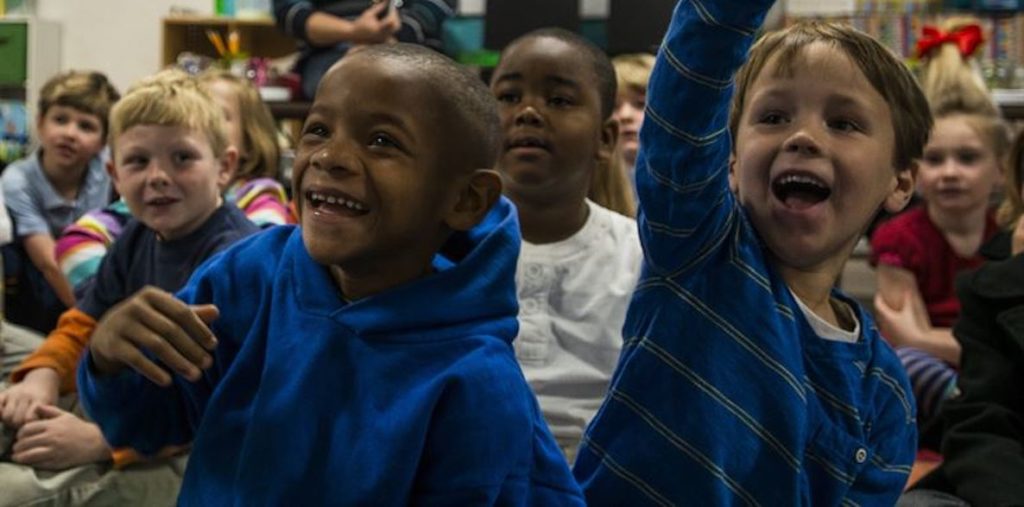At the heart of every conversation about education reform is, essentially, the same thought experiment: Our public school system, as we know it, was designed in the late 1800s. It came with timelines deciding what every child would learn at what age, bells telling students when to change classes, and standards—the one part that has evolved—for how to judge a student’s success.
But what if we have moved past the old model of education—if that no longer works to educate a populace in a diverse, technological, fast-changing society? What should education look like in the 21st Century?
These are the questions at the heart of the 2015 documentary Most Likely To Succeed, and of the Revolution School, a private alternative learning high school set to open its doors next fall. On Tuesday evening, in the Skyline Room of the Free Library’s Central Branch, Revolution School will use clips from the award-winning film as a jumping off point to ask educators, youth, parents and guardians, business leaders, and community partners to reconsider what they think of as American education.
“The idea is a crossing conversation with adults, educators, the community, students, and businesses to think about how these issues of education affect us all,” Jane Shore, head of research & innovation at Revolution School, says.
Most Likely to Succeed Trailer from One Potato Productions on Vimeo.
The documentary, which premiered at Sundance and has since reached over 3,000 communities, follows students at a progressive charter school in San Diego over the course of a year as a way to investigate innovative approaches to education, primarily project-based learning. Its underlying philosophy is one that mirrors the Revolution School, which plans to open its doors in Brewerytown next fall.
Revolution School, founded by Gina Moore, managing principal at financial institution AJO, aims to encourage students to find autonomy and curiosity, connect with what makes them feel passionate, and be engaged citizens—all while letting go of the sole end goal of producing a report card with a letter grade stamp of approval.
“The idea is a crossing conversation with adults, educators, the community, students, and businesses to think about how these issues of education affect us all,” Jane Shore, head of research & innovation at Revolution School, says.
Here’s how it will work: Teachers implement “systems thinking” learning—a holistic approach to analyzing any given system’s smaller parts to better understand how they’re interrelated, and what it means in the context of the larger parts of that system, “to explore more than one subject at a time” and create a “big-picture way of thinking about the world.” As part of that, students will spend two days a week out in the community, following their particular “inquiry lanes” at local businesses, science labs, civic spaces, environmental organizations and more.
While in the school—in a building located near Smith Memorial Playground—students will spend their days in workshops, seminars, and labs, rather than in lectures. Blocks of time are labeled as “Math Lab,” “Inquiry A Seminar” and “Wellness,” to name a few. A sample of Revolution School’s daily schedule lives on the website and offers students a choice start time of 8 am, ending at 3 pm, or 9 am, ending at 4 pm.
At the end of each semester, students will present what they know through a “Presentation of Learning” project: a combination of papers, projects and written exams that will be examined by a panel of teachers and community members in order to offer constructive feedback and ultimately create a portfolio to showcase a student’s skills and achievements they can use in the future. That will culminate with an assessment that emphasizes “growth, not grades:” Teachers will look at progress over time, and students who need more time to understand a subject or skill will receive a “not yet” note and then develop a plan with teachers to achieve the student’s goals.
This all aligns with the school’s four pillars of educational philosophy: diversity (utilizing a bold sliding scale tuition model, Revolution hopes to create opportunity for a range of socio-economic backgrounds); place-based learning that leans into the vibrancy a city like Philadelphia can offer; systems thinking, an approach that looks at the bigger picture and encourages students to make the connections between their academic life and personal ones; and personal development, putting an emphasis on emotional and physical health.
The school also will focus on developing a deeper understanding of community and local politics as interconnected rather than separate. “Part of what we want to underline is that this is just part of civic engagement,” Shore says.
Even Shore acknowledges that Revolution’s approach is not the answer for every kid in Philadelphia. Instead, it speaks to the need for a variety of school models, to address the needs of a variety of people. Like the charter school featured in Most Likely To Succeed, Revolution School is a well-funded experiment. It could provide a lab of sorts, to present a new way to make schools—public, charter and private—prepare students for the 21st Century.
Currently, the school is in its “Year Zero” phase, which began in July of last year. Come this summer, they’ll introduce its first faculty and plan to open the doors on September 4, 2019. Until then, Revolution School plans to host a number of events, like the one on Tuesday, to help introduce its programming and give the community a sense of what it means to be a “place-based learning” environment in Philadelphia.
“We hear very frequently about all the things that are wrong and there’s a focus on all the problems that are happening,” Shore says. “But we see this as an opportunity join together. Because every setting that’s already on the ground and out there has something to show and teach and share.”
Tuesday, January 22, 6 pm-7:30 pm, Free, The Free Library, 1901 Vine St.

